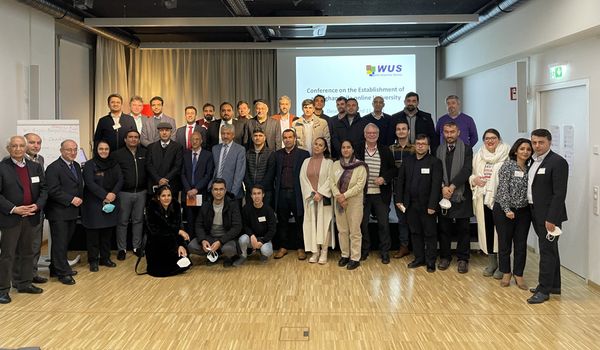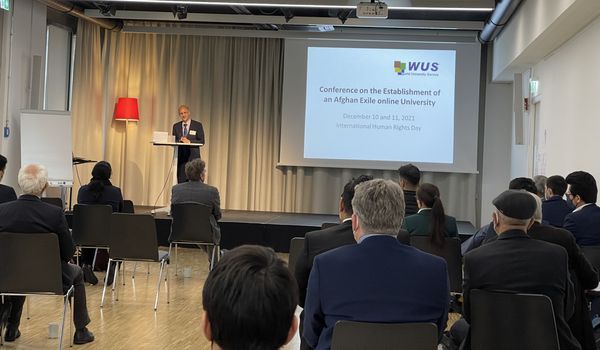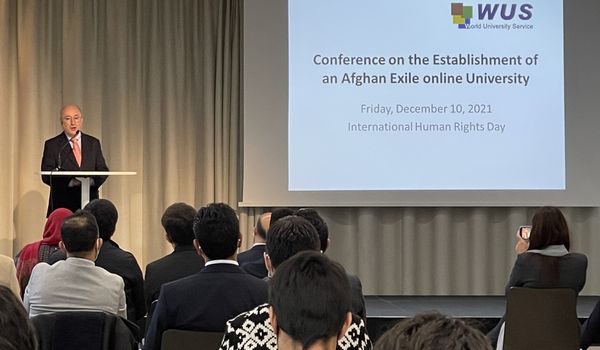Leider sind diese Informationen nur in englischer Sprache verfügbar.
In a first organized response to the Taliban ban on education, the Afghan diaspora academics in Europe gathered in Frankfurt to discuss the establishment of the first “Afghan Exile Online University (AEOU)” with a goal to provide “ideology free” education to Afghans in Afghanistan and abroad. The two-day conference on December 10th and 11th was organized by the World University Service (WUS) in which Afghan scholars mainly from Germany, Austria and Canada including former Afghan officials attended.
Dr. Rangin Spanta, the former foreign minister, Dr. Osman Babury the ex-chancellor of the Kabul University and Sajia Behgum Amin, an advisor to women and youth affairs for the ousted Afghan government were the main speakers who discussed the mission, structure, curriculum, the technical aspects and the legal status of AEOU with dozens of Afghan diaspora in the conference.
Mass emigration of university employees
Babury said that 150 out of 900 Kabul University employees had already left Afghanistan for safety concerns while many more were still seeking their ways out of the country, in a move to reject the Taliban brutal regime that forces its ultra-Islamists ideology on educational system. During the Taliban first rule from 1996 to 2001, there was nearly one million boys going to school while girls were completely banned at all levels from educational institutions.
After their ouster from power in 2001, the number of enrollments boomed from less than a million to over nine million students of which 39 percent were girls. With the Taliban return to power for a second time, only elementary school girls were allowed to go to school. Education was once again banned for all other girls in high schools and universities. Similar to primary and secondary education, the higher education in Afghanistan made tremendous progress over the past two decades. The number of state-run universities and higher education institutions jumped from just seven in 2001 to 39 across Afghanistan. The number of private universities and higher education institutions jumped from almost non to 128 during the 20 years of international community’s political and military engagement in Afghanistan.
Besides the gains of the past two decades, the higher education sector faced multiple security, social, cultural and political challenges under the former government of Afghanistan. In two separate incidents in 2018 and 2020, gunmen attacked Kabul University that killed at least 22 people, stated Babury, but interference by politicians, warlords, extremist groups, and corrupt officials were the other major challenges that Babury faced during his tenure as the chancellor of the Kabul University. For Babury, the biggest challenge, though, was “resistance to change”, by many conservative Afghan students who did not want to adapt to a modern educational environment.
Sajia Behgam Amin reminded the participants that poverty posed another major obstacle to higher education sector particularly for women’s access to education. She said that most Afghan families were unable to support their girls and boys’ education at the same time. Therefore, the families invest only in boys’ education either in Afghanistan or send them abroad. The establishment of free online university will create excellent opportunity especially for Afghan girls to complete their higher education, she said. During her speech, Amin demanded the inclusion of Afghan women not only in the board and university council but also as lecturers and researchers. To admit more women in the study program, she proposed special grants and other incentive opportunities for female students.
Afghanistan loses academic freedom
A month ago, the Taliban de facto acting Minister of Higher Education, Abdul Baqi Haqqani, said that billions of dollars of investment by the international community in Afghanistan’s educational sector in the past 20 years was of “no use to the country”. He said “co-education is against Islamic values” and the ssegregation of classes at universities was their main priority. With Taliban’s confusing statements on education priorities, the people of Afghanistan are concerned about the future of education particularly for women under the Taliban’s repressive rule. Haqqani who is on the Council of the European Union sanctions list for his ‘anti-government militant activities’ in eastern Afghanistan, has been nicknamed “anti-higher education minister” by the Afghan social media users for his rhetoric against the modern studies.
When Taliban took control of Kabul University in August, Babury assured the Taliban during his first meeting that the higher education curricula contained nothing against Islam or against the unity of Afghan people. For the Taliban, however, modern education had no values. Despite of assurances, the de facto higher education authorities want to bring their own ideology and values in the new curricula. With the Taliban as the new rulers of the country, Spanta said that Afghanistan faced “destruction of education and curricula as well as destruction of academic freedom based on the Taliban’s pre-modern views”. The Taliban dehumanize educated Afghans and other religious and ethnic minorities. He, however, expressed optimism the AEOU will enable young Afghan men and women to pursue an ‘ideology-free’ higher education to provide an outstanding opportunity to escape the political and ideological hardship of Taliban.
Objectives and structure of Afghan Exile Online University
Based on the preliminary concept paper presented by WUS to the participants for discussion, the establishment of online university contained five main objectives; first, to provide a study and research space for the Afghan diaspora; second, to provide opportunity for acquiring general professional competences; third, to enhance expert knowledge on Afghanistan; fourth, to promote research on Afghan culture, society and economy; and fifth, to ensure access to study and research for students and scholars living in Afghanistan.
AEOU initially aims to target the Afghan diaspora in the region like Iran, Pakistan and other neighboring countries as well as Afghans in refugee camps beyond the region. The participants of the conference, however, strongly suggested that students inside Afghanistan should be the first priority for admission while the diaspora should be secondary. AEOU will offer both bachelor and master’s degree programs in social science, humanities, economics, business administration as well as information technology with further doctoral studies opportunities. English will be the language of teaching and study. In case of partnership with universities from Germany or other countries within EU and outside EU, the graduates will receive either “double or joint degrees”. A duration of five years is foreseen for both bachelor (3 or 3 ½ years) and master (1 ½ or 2 years) programs. The participating diaspora in the conference strongly disagreed with using the term ‘Exile’ in the name of the university, but they reached a consensus to change the name once the funding for the university is guaranteed. The annual cost of AEOU has been estimated to be between 25 and 30 million Euros. The European governments and the international organizations are believed to provide the estimated budget for the 3000 full-time students. The legal status of AEOU will be registered in the Federal Republic of Germany as a private university if Germany is to be the main donor.
Nicola Beer, a German politician and one of the vice presidents of the European Parliament supported the initiative to establish AEOU and promised to spare no efforts in the European Parliament to gather support for the project. During her speech in the first day of the conference, she said she was disappointed to see Taliban for the second time in power. To support the 63 percent of Afghan population who are under the age of 25, it is important to support Afghan exile community in Europe with Afghan Exile Online University because “education prevails,” emphasized Beer.



